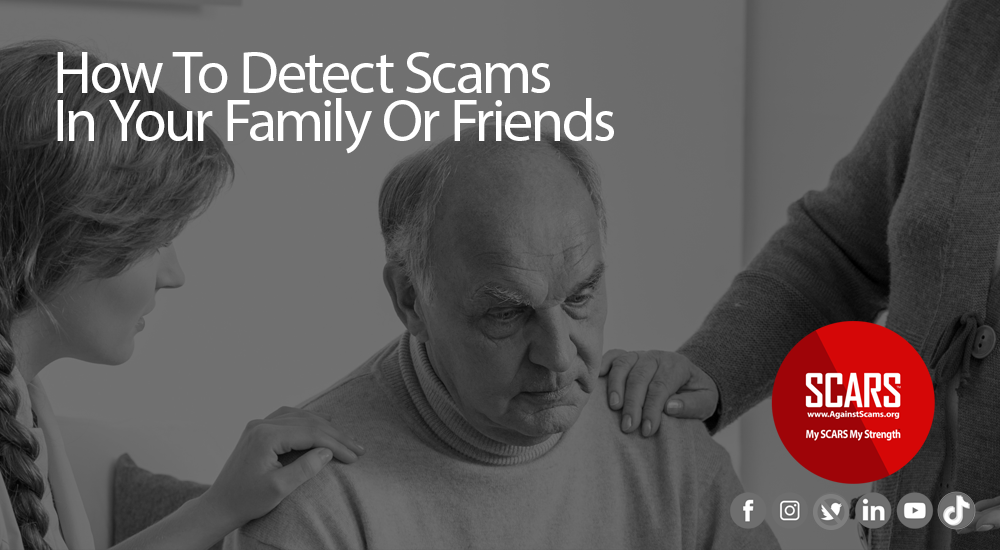
SCARS Institute’s Encyclopedia of Scams™ Published Continuously for 25 Years

How To Detect Scams In Someone You Know
A Guide For Family & Friends
You Can’t Help Them Unless You Are Fairly Certain They Are Being Scammed – This Guide Will Help You To Know!
A SCARS Insight
What If Someone You Know Is A Victim Of Fraud Or A Scam?
Here Are Signs To Look Out For
The list of clues:
- A big change in their availability
- A change in personality – initially like they are in love and later in fear
- Being secretive and unsharing
- Reluctance to talk about their personal life
- Changes in personal finance
- Irritability when asking how they are
- Asking for money or to borrow money for strange reasons
- Always online
- They ask oblique questions about the military or specific professions or business
- Their sleep patterns change – such as being up all night
- Plans for random unexplained travel
- They talk about someone they met online
These are but a few of the obvious and detectable changes that someone goes through when they are being scammed.
Here Are Other SCARS Articles For Family & Friends That May Also Help:
Helping a Friend or Family Member Can Be Hard
It’s Very Easy To Think That If A Loved One Or Close Friend Was Being Scammed, That They’d Simply Tell You!
WRONG!
Unfortunately, whether your loved one is elderly, vulnerable or simply answered the phone to the wrong person, there could be a variety of reasons why they might keep this information to themselves. And this is even more true for adolescents and millennials.
There are many reasons why they may keep this a secret or even lie about it.
What Are They Thinking?
Sometimes they are aware of what they are doing, but generally, it is a combination of denials and a deep belief in the fantasy the scammer provides – this is the manipulation working. Their logical thinking returns to that of a teen in love totally out of control.
They may be embarrassed that they’ve been duped, they may be too frightened to acknowledge what has happened or, they may not even realize that they’ve been targeted by criminals and are losing money.
While you might think that only gullible people fall for scams, in actuality, everyone can be scammed. It is just a question of the right story, the right manipulation, and the right face to deliver it. It is not a function of intelligence – smart people are scammed all the time too.
The complexity and the professionalism of these online criminals mean that they’ll stop at nothing to gain access to a victim’s personal and financial information, and then their money. Simply put, anyone can be scammed and if the person is more trusting, needy, or has no real knowledge of scams, then they will easily become a victim.
Remember, that they are two stages involved here:
- During the scam – hiding to live the fantasy
- After the scam – hiding to avoid judgment and shame
DURING THE SCAM
During the scam, the scammer is controlling the victim in many different ways, and this control will show in the victim’s behavior.
The scammer will manipulate them into believing that no one can understand their love or what they are doing, and to keep it secret. Scammers try hard to isolate victims.
In this mental state, victims will do almost anything for the scammer:
- Lie to family & friends
- Sell personal property and convert it to cash
- Remortgage their house and take out loans
- Share their financial accounts
- Transport drugs
- Embezzle and steal from their employers for the scammer
- Receive stolen property
- Receive money from other scam victims and forward it to the scammer
All of this to please their scammer!
The Clues – During The Scam
We will identify some of the signs that might indicate your loved one or friend is under the control of their scammer or their own fantasy, and has been the victim of fraud or a scam.
BEHAVIOR CHANGES
A Big Change In Their Availability
Scams are very time-consuming and a victim will get to a point where almost every available moment is spent online chatting with their scammer. The victim will no longer have a lot of time for family or friends. If they are working, then as soon as they get home it is online with their fantasy partner.
This will show as a steady stream of canceled plans, postponements, and avoiding contact. Ironically, there are some of the same symptoms as someone suffering from depression.
Always Online
If a friend or family member is constantly online and over the age of puberty then something is wrong. This can be a sign of obsessive-compulsive disorder, but it can also be a sign that they are in a scam. Scams require massive amounts of time, both to control the victim and to get them to do what the scammer wants.
In the beginning, during the grooming phase, the victim will be online for huge amounts of time. You may notice that every time you log into Facebook you see they are online – same for WhatsApp, etc. If you see them constantly connected, then this is a bad sign and at least worth a discussion.
Being Secretive And Unsharing
A very typical behavioral change in scam victims is secretiveness about many things in their life. Typically scam victims know something is wrong, but they want to believe in the scam relationship so much that they avoid any potential challenges that might burst that bubble. Friends and family represent threats to the illusion, and they can react quite angrily when reality is forced on them, so they will maintain secrecy after the first hint that family and friends do not believe in it. This reluctance to talk about their personal life is to help keep the fantasy alive and avoid conflict because deep down they know what is real.
They Ask Strange Questions
For example, they ask oblique questions about the military or specific professions or businesses. Especially relating to places internationally. This comes out of the blue, particularly with a person who is normally not interested in such topics. Scammers pretend to be soldiers, international oil workers or other professionals, or business people involved in gold and other resources.
Be alert if they ask you about bitcoin or other cryptocurrencies. This is a major red flag!
Their Sleep Patterns Change
If you notice that your friend or family member is always tired and they hint that they are now up lake (such as being up all night). Scammers being in Africa or Asia means they often are available to talk in the middle of the night, and in fact use this as a grooming technique. Sleep deprivation is useful in grooming and controlling a scam victim.
They Talk About Someone They Met Online
It can also happen that out of the blue they start talking about someone they met online weeks or months ago. This is often about seeking approval, but it can also be because they are secretly planning a trip. Victims are not always secretive about scam relationships, many times they will announce it from the rooftops! Be cautious if it is already serious and they admit they have not actually met the person!
Plans For Random Unexplained Travel
This is a major danger sign because it can mean they are so under the control of the scammer that they are unable to evaluate real, potentially life-threatening risks! Many scammers will convince the victim that they will meet them in their city, but some are playing a different game that can involve the victim traveling to another country.
This can lead to:
- Becoming a drug mule and potentially spending the rest of their life in jail
- Or marrying the scammer in a country where the local has total control over the victim – where they become basically a prisoner until they can escape (this is called a Gambia scam)
- Or they are kidnapped for ransom when they arrive and the family or friends will have to pay to get their freedom
- Or worse still, there have been victims killed when they visit the scammers home
Do whatever you can to stop them from traveling.
They’re Receiving A Lot of Phone Calls
If your loved one or friend is suddenly receiving a lot of phone calls, and hear that they are giving their bank details over the phone then this is incredibly worrying, especially if they’re cagey or secretive about the calls. This is a first-hand example that they are not only being scammed but are almost unable to resist it.
PERSONALITY CHANGES
A Change In Personality – Initially Like They Are In Love And Later In Fear
They may show signs of being very happy like they have just fallen in love – but they are unwilling to talk about it or share. Scammers prefer that their relationship stay a secret and will caution the victim not to talk about it – “because no one will understand.”
Irritability When Asking How They Are
Like previously said, this can also be a sign of depression. But in the case of a scam victim, they become irritable when anyone asks too much about how they are or other aspects of their daily life. When they go into secretive mode all inquiries will be met with some hostility or just lies.
FINANCIAL CHANGES
Changes In Personal Finance
If a scam victim is sending money to a scammer, they are going to change in many different ways. One of them is the need to send money, and it may not be in logical ways. They may send wire transfers through their back or go to a store and buy a bunch of gift cards. Regardless of how they are sending the money it is going to show in their financial behavior.
They Suddenly Have No Money
If your loved one or friend was previously comfortable, had plenty of savings or had a stable income and is now unexpectedly struggling to make ends meet, there could be a scam. Perhaps they’re asking to borrow money from you to cover their bills or to pay for shopping, or maybe they can no longer afford the things they usually enjoy. This could very likely be that they are sending almost everything to their scammer.
They’re Secretive About Their Finances
Of course, most people keep their finances private, but if you find that your loved one or friend is suddenly very secretive about their money or becomes irritated and defensive about their financial situation then it could be a sign that they are in a scam and under the scammer’s control. This can show when a friend or family member sees receipts for financial transactions – a normal person would easily explain it when asked, but a scam victim will get very defensive and refuse to talk about it or lie!
Asking For Money Or To Borrow Money For Strange Reasons
Another big clue is when they start asking for money or loans, but cannot really provide good reasons or say it is for a very sketchy international business investment or transaction. These are all major red flags that the person is being victimized by a scammer. It is important to not loan any money and do what you can to prevent them from getting a loan, it will only hurt them after they finally realize the truth.
AFTER THE SCAM
After the scam victims are consumed by out-of-control emotions and it depends on how long it will have been since the scam ended.
In other articles we talk about the symptoms that victims have after the scam and they are largely dependent on how soon it has been since the scam ended. Of course, not everyone is the same. Some victims will be much more resilient than others. Some may litterally need in-patient care following the detection of a scam.
Here are some red flags to help identify if someone has been scammed:
- Panic & fear out of nowhere
- Asking about the police and reporting processes
- Desperately looking for information online – unfortunately, they often end up with amateur anti-scam groups that really don’t know what they are talking about
- Looking for anyone that can save them and recover their money – they will be reaching out to attorneys, private detectives and investigators, visiting the FBI and other law enforcement websites
- Asking for attorney recommendations
- Spending time talking with bank officers or other financial professionals
- Neglecting their own family, such as their children
- Missing important events – such as family birthdays
- Believing everyone is judging them
These are just a few and we have them detailed in other articles. We suggest that you look at our Psychology of Scams Article Catalog for more information.
What To Do If You Think Your Loved One Has Been Targeted
If you think your friend or loved one is a victim of a scam or fraud, then consider talking to them about it first. Ask them directly if they have been scammed. They may dodge and lie, but just let them know you are there to help them if they want it. Emphasize that you will not judge them.
Listen to them very carefully and remind them that they’re not to blame, that the scammer is to blame. Also that they are not the only person to have ever fallen for a scam – over 45 million people were scammed in 2020 alone!
Have them immediately read our 3 Steps for New Scam Victims – follow the guidance in it.
This is going to be hard, but they will need friends more than ever. But they are going to be filled with shame. Recovering from a socially engineered relationship scam is not fast. This is serious trauma and it typically takes months to years to recover. There is no way to know how an individual victim will respond.
There are three basic types of victims:
- In denial
- In rage and anger
- A realist
Men tend to be VERY hard to help as they tend to cling to rage and anger. However, what they all need if friends and supporters, but they also need trauma counseling. Support groups, such as those offered by SCARS are extremely effective, but we always recommend that victims also have counseling or therapy.
Just understand that even though the relationship was fake it will feel to the victim that it was very real. This is very much like losing a real loved one. They will be a mess after it is discovered. They will go through real grief following the end of their scam.
Also, they may not be ready to face learning about scams on our website. All of our services, including this website are free, but sometimes it is more helpful to have an actual book. This is why we also publish our SCARS Publishing books for Scam Victims/Survivors (see below). We recommend that you order for them the BLUE, RED, and GREEN books to help them work through this – these do have a small cost, but they offer a different way to help the victim face their situation.
Your help and assistance can be all the difference they need for a faster and more complete recovery, but the odds are they will not accept it – at least not at first. Be patient. You may even need to back away and let them collapse further – hard as that is – before they are ready for help, in that way this is very much like addictions. Eventually, they will come around and all you can do is be there.
-/ 30 /-
What do you think about this?
Please share your thoughts in a comment below!
Table of Contents
- You Can’t Help Them Unless You Are Fairly Certain They Are Being Scammed – This Guide Will Help You To Know!
- Here Are Signs To Look Out For
- Here Are Other SCARS Articles For Family & Friends That May Also Help:
- PLEASE WATCH THIS VIDEO
- It’s Very Easy To Think That If A Loved One Or Close Friend Was Being Scammed, That They’d Simply Tell You!
- What Are They Thinking?
- The Clues – During The Scam
LEAVE A COMMENT?
Thank you for your comment. You may receive an email to follow up. We never share your data with marketers.
Recent Comments
On Other Articles
- on Love Bombing And How Romance Scam Victims Are Forced To Feel: “I was love bombed to the point that I would do just about anything for the scammer(s). I was told…” Feb 11, 14:24
- on Dani Daniels (Kira Lee Orsag): Another Scammer’s Favorite: “You provide a valuable service! I wish more people knew about it!” Feb 10, 15:05
- on Danielle Delaunay/Danielle Genevieve – Stolen Identity/Stolen Photos – Impersonation Victim UPDATED 2024: “We highly recommend that you simply turn away form the scam and scammers, and focus on the development of a…” Feb 4, 19:47
- on The Art Of Deception: The Fundamental Principals Of Successful Deceptions – 2024: “I experienced many of the deceptive tactics that romance scammers use. I was told various stories of hardship and why…” Feb 4, 15:27
- on Danielle Delaunay/Danielle Genevieve – Stolen Identity/Stolen Photos – Impersonation Victim UPDATED 2024: “Yes, I’m in that exact situation also. “Danielle” has seriously scammed me for 3 years now. “She” (he) doesn’t know…” Feb 4, 14:58
- on An Essay on Justice and Money Recovery – 2026: “you are so right I accidentally clicked on online justice I signed an agreement for 12k upfront but cd only…” Feb 3, 08:16
- on The SCARS Institute Top 50 Celebrity Impersonation Scams – 2025: “Quora has had visits from scammers pretending to be Keanu Reeves and Paul McCartney in 2025 and 2026.” Jan 27, 17:45
- on Scam Victims Should Limit Their Exposure To Scam News & Scammer Photos: “I used to look at scammers photos all the time; however, I don’t feel the need to do it anymore.…” Jan 26, 23:19
- on After A Scam, No One Can Tell You How You Will React: “This article was very informative, my scams happened 5 years ago; however, l do remember several of those emotions and/or…” Jan 23, 17:17
- on Situational Awareness and How Trauma Makes Scam Victims Less Safe – 2024: “I need to be more observant and I am practicing situational awareness. I’m saving this article to remind me of…” Jan 21, 22:55
ARTICLE META
Important Information for New Scam Victims
- Please visit www.ScamVictimsSupport.org – a SCARS Website for New Scam Victims & Sextortion Victims
- Enroll in FREE SCARS Scam Survivor’s School now at www.SCARSeducation.org
- Please visit www.ScamPsychology.org – to more fully understand the psychological concepts involved in scams and scam victim recovery
If you are looking for local trauma counselors please visit counseling.AgainstScams.org or join SCARS for our counseling/therapy benefit: membership.AgainstScams.org
If you need to speak with someone now, you can dial 988 or find phone numbers for crisis hotlines all around the world here: www.opencounseling.com/suicide-hotlines
A Note About Labeling!
We often use the term ‘scam victim’ in our articles, but this is a convenience to help those searching for information in search engines like Google. It is just a convenience and has no deeper meaning. If you have come through such an experience, YOU are a Survivor! It was not your fault. You are not alone! Axios!
A Question of Trust
At the SCARS Institute, we invite you to do your own research on the topics we speak about and publish, Our team investigates the subject being discussed, especially when it comes to understanding the scam victims-survivors experience. You can do Google searches but in many cases, you will have to wade through scientific papers and studies. However, remember that biases and perspectives matter and influence the outcome. Regardless, we encourage you to explore these topics as thoroughly as you can for your own awareness.
Statement About Victim Blaming
SCARS Institute articles examine different aspects of the scam victim experience, as well as those who may have been secondary victims. This work focuses on understanding victimization through the science of victimology, including common psychological and behavioral responses. The purpose is to help victims and survivors understand why these crimes occurred, reduce shame and self-blame, strengthen recovery programs and victim opportunities, and lower the risk of future victimization.
At times, these discussions may sound uncomfortable, overwhelming, or may be mistaken for blame. They are not. Scam victims are never blamed. Our goal is to explain the mechanisms of deception and the human responses that scammers exploit, and the processes that occur after the scam ends, so victims can better understand what happened to them and why it felt convincing at the time, and what the path looks like going forward.
Articles that address the psychology, neurology, physiology, and other characteristics of scams and the victim experience recognize that all people share cognitive and emotional traits that can be manipulated under the right conditions. These characteristics are not flaws. They are normal human functions that criminals deliberately exploit. Victims typically have little awareness of these mechanisms while a scam is unfolding and a very limited ability to control them. Awareness often comes only after the harm has occurred.
By explaining these processes, these articles help victims make sense of their experiences, understand common post-scam reactions, and identify ways to protect themselves moving forward. This knowledge supports recovery by replacing confusion and self-blame with clarity, context, and self-compassion.
Additional educational material on these topics is available at ScamPsychology.org – ScamsNOW.com and other SCARS Institute websites.
Psychology Disclaimer:
All articles about psychology and the human brain on this website are for information & education only
The information provided in this article is intended for educational and self-help purposes only and should not be construed as a substitute for professional therapy or counseling.
While any self-help techniques outlined herein may be beneficial for scam victims seeking to recover from their experience and move towards recovery, it is important to consult with a qualified mental health professional before initiating any course of action. Each individual’s experience and needs are unique, and what works for one person may not be suitable for another.
Additionally, any approach may not be appropriate for individuals with certain pre-existing mental health conditions or trauma histories. It is advisable to seek guidance from a licensed therapist or counselor who can provide personalized support, guidance, and treatment tailored to your specific needs.
If you are experiencing significant distress or emotional difficulties related to a scam or other traumatic event, please consult your doctor or mental health provider for appropriate care and support.
Also read our SCARS Institute Statement about Professional Care for Scam Victims – click here to go to our ScamsNOW.com website.










![Financial Recovery - Avoid Money Triggers - Perspective on Money for Scam Victims - 2023 [UPDATED 2025] Financial Recovery Money Triggers Financial Recovery - Avoid Money Triggers - Perspective on Money for Scam Victims - 2023 [UPDAYED 2025] - on the SCARS Institute RomanceScamsNOW.com - the Encyclopedia of Scams™](https://romancescamsnow.com/wp-content/uploads/2025/06/Financial-Recovery-Money-Triggers.png)
![Married Scam Victims: Rebuilding Trust in a Marriage Following a Romance Scam - [UPDATED 2025] Married Scam Victims 2025 Married Scam Victims: Rebuilding Trust in a Marriage Following a Romance Scam - [UPDATED 2025] - on the SCARS Institute RomanceScamsNOW.com - the Encyclopedia of Scams™](https://romancescamsnow.com/wp-content/uploads/2021/04/Married-Scam-Victims-2025.png)




Extremely important article giving short and sweet explanations of what a scam looks like, what their loved one is going through and a target list of what to do. Discovering a friend or family member in a scam gives a person a chance to pull them back and pause. For some that is what is needed. As the article pointed out some will fight tooth and nail in denial about the reality of their crime.
This article speaks the truth. It describes what the scam victim is going through perfectly.